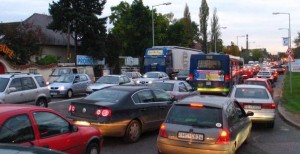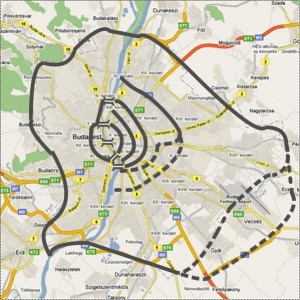Title: Preliminary study on the reasonableness, feasibility and zone options of a Budapest congestion charge
Client: Municipality of the City of Budapest Department of Transport
Period: 10/2007 – 03/2008
Description:
 The aim of the study was to examine the reasonableness of implementing a congestion charging scheme in Budapest – as a tool influencing car use and reducing environmental burden –, and in the case it is reasonable, what main requirements should it meet.
The aim of the study was to examine the reasonableness of implementing a congestion charging scheme in Budapest – as a tool influencing car use and reducing environmental burden –, and in the case it is reasonable, what main requirements should it meet.
As a first step we reviewed traffic-influencing tools used in urban areas, setting the question of congestion charging into a broader context. We surveyed the features of congestion charging systems operating in different cities, conceptual differences between different solutions, their financial accounts (invetments and operating costs, revenues, financing), use of revenues, and traffic and environmental impacts. As a second step, based on the international experiences, but within the local framework and adapted to the conditions of the city we prepared the concept of a Budapest congestion charge, including zone options and connected investment package (public transport and cycling improvements, park&ride developments, adaptation of parking scheme). As part of the study we examined a sample area in more detail.
 According to the results of the study, the main aim of implementing congestion charging in Budapest could be influencing traffic, reducing congestion and through traffic in the inner city. A secondary effect could be a reduction in traffic pollution, and a subordinate, but still important aim to raise revenues, primarily for the development of public transport. Congestion charging could be only implemented coordinated with other traffic management tools, and after meeting some conditions (development of public transport and intermodal points). Zone options proposed for more detailed planning are Nagykörút (Grand Boulevard) and the ring road in Buda; Hungária körút and the ring road in Buda; and the combination of these two zones.
According to the results of the study, the main aim of implementing congestion charging in Budapest could be influencing traffic, reducing congestion and through traffic in the inner city. A secondary effect could be a reduction in traffic pollution, and a subordinate, but still important aim to raise revenues, primarily for the development of public transport. Congestion charging could be only implemented coordinated with other traffic management tools, and after meeting some conditions (development of public transport and intermodal points). Zone options proposed for more detailed planning are Nagykörút (Grand Boulevard) and the ring road in Buda; Hungária körút and the ring road in Buda; and the combination of these two zones.
Documents:
Hatékony közlekedésmenedzsment Budapesten – A fővárosi behajtási díj indokoltságának, bevezethetőségének és zónarendszerének vizsgálata (study in Hungarian, pdf)